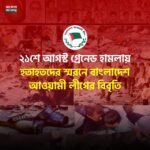পাঁচ বছরের পূর্বাভাস—তিন দৃশ্যপট
(১) বর্তমান অন্তর্বর্তী সরকার আরও ১–২ বছর থাকবে। তারপর নির্বাচনে বিএনপির ক্ষমতা আরোহণের সম্ভাবনা। বিএনপি পুরো মেয়াদ শেষ করতে পারবে কি না—তা নির্ভর করবে কিছুটা ভারতের কৌশলগত অবস্থানের ওপর এবং কিছুটা আওয়ামী লীগের প্রত্যাবর্তন ও শক্তি সঞ্চয়ের ওপর। যদি বিএনপি তার বিরুদ্ধে পরিচালিত পরিকল্পিত সহিংসতা-বিরোধী আন্দোলন দমনে ব্যর্থ হয় তবে ১/১১-র পুনরাবৃত্তি ঘটবে।
(২) অদক্ষতা/আইন-শৃঙ্খলা অবনতির কারণে অথবা ছাত্রচাপের মুখে সংস্কার-মিশনে হাত দিলে, নির্বাচন না হয়ে অন্তর্বর্তী সরকার ক্ষমতায় থাকবে। তখন দুর্বল মন্ত্রীরা বদলাবে এবং ড. ইউনুসকে প্রেসিডেন্ট করে ঐকমত্যের জাতীয় সরকার গঠিত হবে।
(৩) সংবিধান বদলের ক্ষীণ গুঞ্জন উচ্চকিত হলে—আগামী পাঁচ বছর যাবে গণপরিষদের নির্বাচন, সংবিধান প্রণয়ন ও গণভোটে।
যাই ঘটুক, এই পাঁচটি বছর দেশকে বাস করতে হবে বিভ্রান্তি, অস্থিরতা, প্রতিবাদ, আন্দোলন, হরতাল-অবরোধ, সহিংসতার ভেতর দিয়ে। পঙ্গু অর্থনীতি দরিদ্রদের আরও বিপদ ফেলবে এবং সামাজিক-অর্থনৈতিক সূচকে বাংলাদেশ ক্রমাগত পেছাতে থাকবে।
সমাপ্ত
———————————————————————
এই বিশ্লেষণ সম্পূর্ণভাবে আমার নিজস্ব চিন্তা, অভিজ্ঞতা ও বাস্তব পর্যবেক্ষণের উপর নির্ভর করে রচিত। এর মূল ভিত্তি গড়ে উঠেছে ৫ আগস্টের পরবর্তী ঘটনাপ্রবাহ এবং তার বহুমাত্রিক সামাজিক-রাজনৈতিক প্রতিক্রিয়ার প্রেক্ষাপটে। ‘জুলাই সনদ’, সাংবিধানিক সংস্কার এবং আসন্ন জাতীয় নির্বাচন—সবকিছুই আজ ৫ আগস্টের ছাত্র আন্দোলনের প্রত্যক্ষ ও পরোক্ষ প্রভাবে নতুন দিকনির্দেশনা পেয়েছে।
আমার এই বিশ্লেষণ রাজনৈতিক দলগুলোর অবস্থান কিংবা বিভিন্ন মতাদর্শের সঙ্গে নাও সামঞ্জস্যপূর্ণ হতে পারে—এটিই গণতান্ত্রিক সমাজে স্বাভাবিক বিষয়। তবুও আমি সর্বোচ্চ চেষ্টা করেছি বিষয়টি পেশাদার নিরপেক্ষতা ও বাস্তব মূল্যায়নের আলোকে উপস্থাপন করতে। এখানে ব্যক্তিগত বিশ্বাস, দলীয় আনুগত্য বা রাজনৈতিক পক্ষপাতের কোনো প্রভাব নেই; শুধুমাত্র ঘটনার যৌক্তিক বিশ্লেষণই এই লেখার মূলভিত্তি।
Where are we headed in the next five years?
Last Part
After discussing possibilities, we can predict Bangladesh’s future in the next five years. There are three main scenarios.
The first is that the current interim government will remain in power for one or two years, followed by the BNP. However, if the BNP fails due to orchestrated violence, opposition movements, there’s a chance the 1/11 syndrome will repeat.
The second is that the current interim government will remain in power if it can’t hold an election due to incompetence, deteriorating law and order, or if the government is tasked with reforms under student pressure. In that case, weak cabinet members may be replaced, or a national unity government with Dr. Yunus as President may be formed.
The third is, if the current low noise of changing the constitution turns into an uproar, the next five years could see an election, constitution drafting, and referendum.
Whatever happens, the country will face confusion, disturbances, protests, movements, strikes, shutdowns, and violence. The limping economy will exacerbate the situation, especially for the impoverished, and the country will likely fall behind in all social and economic indicators.
End of final part.
———————————————————————
This analysis is entirely based on my own thoughts, experiences, and direct observations. Its foundation lies in the chain of events that unfolded after August 5 and the multifaceted social and political reactions that followed. The “July Charter,” the constitutional reforms, and the upcoming national election have all taken on new directions—directly and indirectly influenced by the student movement of August 5.
My analysis may not align with the positions of political parties or with different ideological perspectives—and that’s natural in a democratic society. Still, I have made every effort to present the issue with professional objectivity and a realistic assessment. There is no influence of personal belief, party loyalty, or political bias here; the analysis rests solely on the logical interpretation of events.







